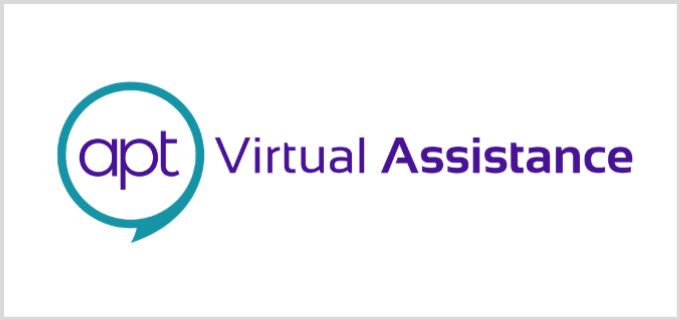This is a Virtual Assistant case study and interview with Sarah Szekir-Papasavva. Sarah set up her award-winning business Apt Virtual Assistance (AptVA) in 2018 and provides small business owners with high-quality administrative and creative support. Originally from Brazil, Sarah currently lives in London with her husband and young daughter.
What did you do for a living before you became a VA?
I originally trained in Fine Art – I have a BA degree in Painting and a Masters degree in Fine Art, for which I specialised in Digital Art through the University of Leeds. I then relocated to London and eventually started a career as a Personal Assistant. I really enjoyed it, so I decided to go up a level and trained as an Executive Assistant, receiving my qualification through Souters in London.
My previous role, prior to setting up my own business, was a corporate role as EA to the Director of a Private Commercial Property Group worth £2.7 billion, based in Central London. It was a very demanding role, in terms of working hours and travel, but one that I very much enjoyed.
Once I started a family, however, I realised that I would need much more flexibility to be around my daughter, and so I revaluated my position.
When did you first hear about VAs or became aware they even existed?
I learnt about the Virtual Assistance world precisely when my maternity leave was ending and I started to realise that although I had every intention to go back to my job if I did go back to the same position, I would end up hardly seeing my daughter awake.
I started to fully understand the value of flexible working then, and so I started to research and explore alternative options. That’s when I did some Googling and came across the ‘VA’ term and of course, the VA Handbook website.
Which to this day is the greatest resource I’ve ever come across for VAs!
I was then inspired to start my own Limited Company – Apt Virtual Assistance.
What was the trigger for you becoming a VA?
Apart from the advantages that come with having my own business and being my own boss, as well as the flexibility to suit a better work-life balance, for me, the main triggers for becoming a VA were two:
The first was that I needed very little to be able to set up and open for business – at first, I invested in the very basic things I needed to have in place to be compliant and have a robust business setup, so: contracts, insurance, a good laptop, etc.
I had previous experience in setting up a small business, albeit a product-based business, rather than service-based, but it helped all the same.
The second trigger was being able to bring together both my passions: for the creative side of things, and for the admin and organisational side of things.
The prospect of variety, and of being able to be creative again in problem-solving, whilst constantly learning, adapting, and also joining an industry that was slowly but surely growing in the UK, motivated me and made the journey to becoming a VA very exciting.
Did you just leave your job or start VA-ing gradually?
Once my maternity leave ended, I had a very honest conversation with my previous boss, who was very supportive and kept the door open to me, which made all the difference in taking the leap. We still have a great relationship and I’m very grateful for this.
The first month was tough, as I figured out how to market myself and who my ideal clients were, so there was some trial and error, but thinking back, the jump was a necessary one and enabled me to really go for it.
I knew I was ready, and the push prompted me to give it my all to make it succeed – after all, I needed to make it work so that we wouldn’t suffer financially.
Where did you find the help or advice you needed when setting up?
Along the way, I was extremely fortunate to have many supportive people around me, and great resources too, both free and paid, to make good use of. I read as much as I could about this amazing (and still unregulated) industry in the UK and did my market research to decide which services to offer and to whom.
I also read a lot about setting up a successful business, which included advice on mindset as well, from brilliant people such as Brene Brown, Jen Sincero and Greg McKeown.
I found it very helpful to be a part of online groups, where I met and networked with many other VAs in various stages of their businesses, and tried to learn from their experiences too. As I mentioned before, the VA Handbook was a huge source of valuable information, and I then went on to buy Jo’s course and be a part of the VA Rock Stars, a select group with access to Jo’s DIY course.
I also value the work that the Society of Virtual Assistants (SVA) do, especially the Annual VA Survey, which is very helpful to establish the common factors VAs share. Later on, in my second year in business, I also started working with a wonderful Executive Coach, who helped me focus on how I wanted to scale the business, and which paths I could take.
I advocate finding the help that most resonates with you, as there is so much out there and each will have a different style and approach, which is great because you can then find what resonates most with you.
For me, one of the best parts of being your own boss and setting up your own company is that ultimately you decide – and YOU get to shape your business to reflect your values and attract the ideal clients for you.
Who was your first client and how did you get them?
My first client was a friend, who had heard I was setting up my own company and had previously admired my organisational skills. They were scaling their successful business very quickly and needed some remote organisational help with their events, email marketing and general office management tasks.
I was about three weeks into setting up my business and they were my first retainer client, which I was very grateful for. I no longer work with them, but it was a great experience, from which I learnt many things, including which direction I wanted to take my business.
Do you have a niche?
Initially, I did not have a niche and I did offer a huge range of services, to a broad audience. It was only with a little bit of time, and consequently experience, that I narrowed down my market, which happened when I was finally able to identify who my ideal client was.
I confess that it took me a while to understand the importance of having that ideal client avatar clearly figured out.
In the beginning, I thought that any client would be welcome – however, I learnt with time that this is not true if you want to have a business that you genuinely enjoy working in.
What I mean by this is, that one of the great benefits of being my own boss is precisely so that I can choose to only work with those who have similar values and work ethic as me – I often didn’t have that choice working in an office.
Of course, not every client is perfect, and there will always be ups and downs, after all, that is the reality of business and you’ll be responsible for every choice you make, but at least you’ll be in control of working for people whose work you admire or believe in.
Another realisation I had early on in my journey when identifying niches was that not taking a client on is ok, as rather than losing out, you are only making space for the better/more aligned/ideal client to come along – and they are, more often than not, just around the corner!
How would you say you were different from other VAs?
I think what most differentiates me from other VAs is the mix of admin and creative tasks that I offer. My background is originally in Fine Art – I studied for a four-year BA degree in Painting in the south of Brazil and then I did a practice-based Masters degree (MFA) in Leeds, where I specialised in Digital Art.
It was only later on that I built a career as a PA (and subsequently as an EA), as admin and organisation are another passion! Being a VA has allowed me to join these two passions, which is why I offer a range of admin and creative services to clients.
To me, being creative doesn’t just mean the design work though, I like to find ways of being creative through problem-solving, thinking outside the box, being proactive, and also within the technology that I use and how I use it, to make virtual working as effective and efficient as possible both for my own business and for my clients’.
I also offer Bilingual Assistance in Brazilian Portuguese, which covers the same services I normally offer, but in Brazilian Portuguese, my mother tongue, and makes use of the many student years I worked as an English/Portuguese translator in Brazil.
My approach is to consult and create bespoke briefs for clients, depending on what they are looking for or need, and from there on mapping out a plan of our work together, with clear expectations and suitable systems.
 What’s the best thing about being a VA?
What’s the best thing about being a VA?
Apart from the flexibility, the opportunity to create and shape my own business, and the variety of work, which can make no two days the same (which to me is highly motivating!), I think the best thing for me is making a difference.
Each one of my clients is a small business owner, which means they are working towards making their dreams come true – giving their all to create and shape a business they truly believe in and are passionate about.
My work means that I am a part of that in various degrees, and the difference my work makes to their lives is important to me – whether it allows them to scale their business faster, or just be able to take a day off with the peace of mind knowing they can really switch off for once.
What’s the hardest thing about being a VA?
I think for me it’s probably maintaining the ideal work-life balance that I aspire to, and really practising what I preach to my clients. Sometimes when you’re working hard to make sure that no balls are dropped in the huge juggling act that life is, and making sure that everything is covered for every client, it can be easy to end up slightly tipping that balance.
It’s important to set those boundaries and expectations right from the beginning so that you are less likely to lose balance later down the road.
For example, I had information on my working hours and rates for urgent work within my contract from the very start, and this has enabled me to maintain a healthier balance more easily, as it is clear to my clients what to expect from me and to respect this.
In my opinion, running your own business and at the same time providing a service requires high-level planning and organisation to make sure you are efficiently and successfully doing both, whilst maintaining your home, mind, and health in top shape.
How virtual are you?
I am 100% virtual and worked this way even before the pandemic restrictions. However, when it was possible, I did love having the opportunity to meet clients and visit their premises at least once when first meeting. I would usually meet them in person for a coffee and/or visit their office.
I also attend networking meetings (all virtual now!), and love attending conferences and events related to the industry – especially the UK VA Awards – I’ve luckily collected six beautiful star awards over the last three years, and have met lovely people from the VA community.
I also usually attend WebSummit annually, which is an annual tech conference that attracts around 70K people during the three days of talks, roundtables and workshops. It’s an amazing place to learn about some of the groundbreaking developments within the tech world, and how they can be used across every industry in different ways.
I’m a huge fan of exploring new ways of improving the way that we work as VAs, and having the opportunity to hear from the founders of the software we use daily is instrumental.
How do you find your clients?
Most of my clients come from word of mouth, and through networking. Referrals from clients are wonderful, not only because they serve as great feedback, but because often the people connected to our clients tend to be a great fit for us too.
Networking is another great way that I’ve found to connect with small business owners, and I am part of two local networks, which meet up monthly. I have been a member of The Athena Network for almost 3 years now, and I am a huge fan of their meeting structure and the inspirational women who are part of it.
I am also VA to two Regional Directors, and so I know first-hand how much dedication and member engagement take place, and it has been a great investment for me and my business.
Although networking can be different for everyone, I would recommend trying it at least a few times in order to see results, and it’s a skill which can be learnt in my opinion, so the more you do it, the better at it you’ll be, and the more you may enjoy it!
How do you manage your personal/work-life balance?
It’s a balancing act that is certainly a constant challenge. As a problem solver, I am always planning ahead and organising my routine with the aim of having the most effective work/life balance possible.
I do also try to practise what I preach by outsourcing what isn’t essential for me to do myself, as this is what I recommend to my clients!
I think that, what has helped me most during this challenging time where our work/life balance has been so mixed up due to the pandemic and lockdown in the UK, is having a flexible routine – so one where I am able to re-evaluate and prioritise often, while not being too hard on myself when things simply cannot be achieved as I’d like them to be…
Lately, this type of self-care has been vital in keeping me sane and productive.
How do you manage your clients, their work and their expectations?
I take pride in having a clear setup and structure in place for clients from the very beginning – that way there is no room for misunderstandings or unclear expectations.
For my own organisation, I use a project management tool to set up each client so I have easy access to their information and task list, and so that I can keep track and also delegate work to others if needed.
For my clients’ organisation, we have an initial consultation where we outline how they prefer to communicate, which channels they use or would like to use, how tech-savvy they are, what access I’ll need, etc.
We always tend to communicate well when a good layout/system is in place for them, and this makes everything smoother for all involved.
What technology, websites, or apps are invaluable to your working life?
The beauty of being virtual, as you know, is that with a bit of tech – give me a laptop and an internet connection – I’m up and running from anywhere, and ready for anything.
What a great industry to be in right now, am I right?!
The tools I value the most and use on a day to day basis are the ones that help me run both my business and my client’s businesses. So, they are mostly: project management tools, such as Asana and Trello; a CRM system, mine is Capsule; a time-tracking tool, I use Toggl. LastPass, for the million passwords we have! Online storage such as Dropbox and Google Drive. Zoom of course!
Also, email marketing platforms – I use a few different ones with clients, but mainly Mailerlite. And specifically for me, also professional editing software – as well as Canva, I also use Adobe Creative Cloud, which has Photoshop, Indesign, etc. There are so many others, I’d need a few pages to list them all.
I also keep up with important updates through a selection of newsletters and websites that are relevant to my business and my clients’.
Would you do anything differently if you had to start again?
To be honest, I don’t think I would… I think the timing for me was right, and I’m grateful for having had the courage to take the leap and go for it.
I think I believed in it enough, and in myself too, and so that made a huge difference in making it work.
I’m also grateful for having found such great resources as the VA Handbook and the amazing support of so many inspirational people in business.
What advice would you give to someone considering becoming a VA?
I think that apart from making sure you have everything you need in place – and by that I mean basic things, such as knowing your prices, having your contracts ready, being ICO registered, having insurance, having your contacting details ready to give out, etc.
Then to me, the most important aspect to fully understand and bear in mind is that once you become a VA, running your own business, you’ll essentially have two jobs.
The first will be ‘VA-ing’, doing the work, providing the service to clients. And the other will be running a business, and being a small business owner.
For me, this was a plus – I love having the freedom of being my own boss and setting the rules, and having the flexibility to fit around my family.
I also really enjoyed creating my Corporate Social Responsibility (CSR), thinking of my business mission and values – laying out what I wanted to achieve, and defining who I was going to help. However, the fact is that this all takes (unpaid) time, sometimes a lot of it, and then you still have your clients to assist.
So, my main advice is to make sure you have realistic expectations of the hard work you’ll have to put in before you get to the other side and reap the benefits.
Also, don’t forget that business will always have ups and downs, and as in all roles, nothing is perfect – sometimes clients may turn out to be not-so-ideal, other times a global pandemic will come about and wipe half your clients away…
But at times like those, you have the opportunity to build your resilience up, and if you’re well prepared, the impacts will be less damaging, and you’ll be able to pick your business up again and get back going.
It has so far been the best job I’ve ever had – I only had to go and create it for myself!
Connect with Sarah Szekir-Papasavva on Instagram.
Wanna be a Virtual Assistant?If you were inspired by Sarah’s story then sign up for my flagship DIY VA course and start your own journey today. With lifetime access and an incredible trainee-only support group, I hold your hand through the entire process and support you all the way. |
 |







Leave a Reply